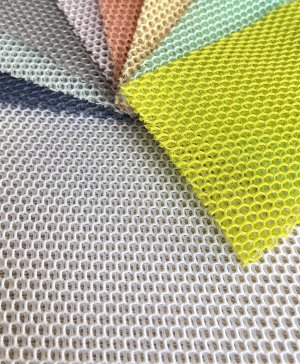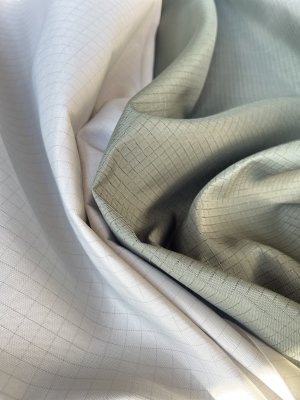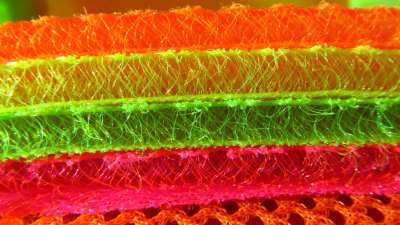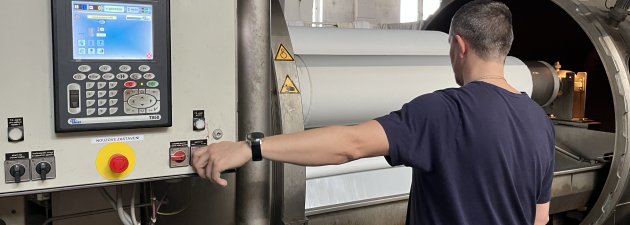Don’t throw obstacles in our way. Don’t overwhelm us with unnecessary bureaucracy, and we’ll be able to handle sensible environmental regulations. This has long been the message in unison from business leaders. One such example is TEBO, winner of the AMSP ČR Main Project Award for “Year of New Energy 2024” – a manufacturer of technical textiles for demanding industrial applications based in Nová Včelnice.
“Four years ago, one of the most important Czech companies in the field of water purification, treatment and recycling for households and industrial entities – Envi-Pur – approached us with the request to delve deeper into the issue of wastewater treatment in textile manufacturing plants. With our consent, they installed a pilot unit on our premises and monitored the structure of the wastewater before and after mixing over nine months between 2021 and 2022. During the research, Envi-Pur also offered us a water audit, which is part of their service portfolio,” recalls the owner and CEO of TEBO Petr Čermák.
 For TEBO’s top management, this brought new insights into water management and inspiration for further innovative solutions. In 2023, the textile company installed a pipeline filter that captures particles as small as 50 microns and purifies the technological water that has passed through the company’s internal pipeline before returning to the production process. The year before, they put into operation a cooling water recovery system used for dyeing equipment and its reuse. The roof coverings on most of the buildings on the premises were also replaced, which is a prerequisite for the use of rainwater in production.
For TEBO’s top management, this brought new insights into water management and inspiration for further innovative solutions. In 2023, the textile company installed a pipeline filter that captures particles as small as 50 microns and purifies the technological water that has passed through the company’s internal pipeline before returning to the production process. The year before, they put into operation a cooling water recovery system used for dyeing equipment and its reuse. The roof coverings on most of the buildings on the premises were also replaced, which is a prerequisite for the use of rainwater in production.
“However, our largest investment is still ahead. It involves the reconstruction of the industrial and rainwater drainage systems, and last but not least, the modernization of our wastewater treatment plant,” adds the company owner, noting that such projects require a detailed economic impact study.
The worst part is uncertainty
The Czech family-owned company TEBO continues the uninterrupted tradition of textile manufacturing in Nová Včelnice, whose origins date back to 1860. Over time, the name of this traditional supplier of fabrics and knits for the footwear and furniture industries changed, and its product portfolio was adapted to market demand. In 2020, the Čermák family became its sole owner.
 “Although I had years of experience with the company as a minority shareholder, taking the helm of the company during the onset of the COVID pandemic brought me many sleepless nights. Suppliers were unable to provide materials or guarantee delivery times, and there was a decrease in orders. Under quarantine measures, it was difficult to meet our obligations to both customers and banks. But the crisis tested our resilience – working under great pressure, stepping out of our comfort zone, strengthening team unity and our own capabilities. The new economic reality forced us to rethink how we procure materials, manage energy and streamline production.”
“Although I had years of experience with the company as a minority shareholder, taking the helm of the company during the onset of the COVID pandemic brought me many sleepless nights. Suppliers were unable to provide materials or guarantee delivery times, and there was a decrease in orders. Under quarantine measures, it was difficult to meet our obligations to both customers and banks. But the crisis tested our resilience – working under great pressure, stepping out of our comfort zone, strengthening team unity and our own capabilities. The new economic reality forced us to rethink how we procure materials, manage energy and streamline production.”
While Czech companies are gradually adapting to the demands of the new business environment, one major challenge remains out of their control, and even the long-term forecast is not very optimistic. Energy prices remain a major problem. “Energy costs keep rising. To stay competitive, we can no longer reflect all increased production expenses in product prices. Textile manufacturing is a very energy-intensive industry, relying heavily on electricity, natural gas and water. One way to reduce costs is through the 2024 water audit. We expect smarter use of surface water to lower our operating expenses to some degree. However, we can’t influence everything. Moreover, as everyone seeks cost cutting, we’re seeing a decreasing quality of supplied raw materials.”
Innovation keeps products attractive
Stability, reliability, responsiveness and innovation have helped TEBO retain a wide network of loyal customers both in the Czech Republic and abroad, even in difficult conditions. One-third of the company’s production serves domestic clients, while the remaining two-thirds go abroad. Major European markets include Denmark, Sweden, Finland and also Germany. Outside Europe, the company mainly exports Raschel knits (so-called 3D) to Southeast Asia, namely to Indonesia, South Korea and other countries.
 In terms of industry, these are companies that produce outdoor sports equipment, orthopedic aids, protective ballistic fabrics, multifunctional and medical textiles, interior components for cars, home textiles, materials for construction and industry and fiber-based composites such as filtration media.
In terms of industry, these are companies that produce outdoor sports equipment, orthopedic aids, protective ballistic fabrics, multifunctional and medical textiles, interior components for cars, home textiles, materials for construction and industry and fiber-based composites such as filtration media.
“Our biggest competitive advantage is the ability to quickly respond to customer demand for both special and traditional textiles and to produce in both large and small batches. We couldn’t do that without constantly innovating and modernizing our machinery. Since we own a weaving mill, knitting mill, wet and dry textile finishing, and dyeing facilities, we are independent in production. We are able to finalize with special treatments and thus add value and durability to our products.”
In recent years, we have installed and put into operation a multi-purpose coating and laminating line that uses modern hot melt adhesive application technology. This allows bonding not only of textiles but also of membranes and other flexible non-textile materials. This year, we installed a prototype of a Raschel knitting machine, which was developed for us by a family-owned company from Catalonia,” notes Petr Čermák, referring to the nearly 30-year history of Raschel knitting production in the Czech Republic, which was first introduced by TEBO in 1996.
One team, common goal
At TEBO, everyone is involved in developing new products – from development and production staff to the procurement team. At TEBO, everyone in the company – from development and production staff to the procurement team – is involved in developing new products, in cooperation with suppliers of input raw materials. Key contributions in developing new products and technologies also come from partnerships with the Faculty of Textile Engineering at the Technical University of Liberec and the Faculty of Chemical Technology at the University of Pardubice.
“Our long-term goal is to develop textiles in new areas in collaboration with current and potential customers, reduce the energy and material intensity of production and better understand product life cycles and leverage their biodegradability potential,” says Čermák. “In key decisions, I rely mainly on myself and my family, whose members are actively involved in the company’s operations. Despite careful investment planning, business always carries risk – that’s why I value the support of our financial partner, which has been Komerční banka since our first days. Thanks to their loans, we have been able to purchase top-tier machinery that allows us to compete in demanding markets.”
Written by Věra Vortelová
Photo credits: TEBO




